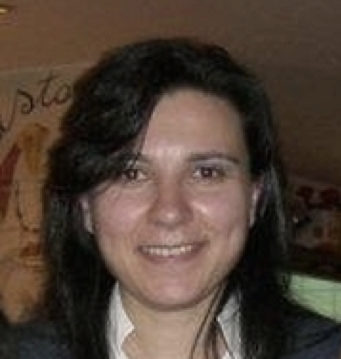
Dr Romina Vuono
She/Her
On this page
About
Dr Romina Vuono obtained her first degree (Laurea Magistrale) in Biological Science at the University of Calabria (Italy) in 2003 and MSc (2nd level) in Biotechnology in 2005. Following this, Romina completed her PhD in Molecular Bio-Pathology (Neuroscience) at the same University in 2009. Her PhD thesis focused on the molecular effect of two novel tau mutations identified in a patient with Frontotemporal Dementia. Whilst at the University of Calabria, she was also Teaching Assistant for the Molecular Biology (Biological Sciences degree) and Biotechnology (Biotechnology, MSc 2nd level) courses.
In early 2010, Romina moved to the University of Cambridge and spent 9+ years at the Department of Clinical Neurosciences where she gained a wide experience across the basic and clinical neurosciences. Her post-doctoral research focused mainly on a) the role of tau in Huntington’s disease (HD), showing for the first time a novel role of tau in the pathogenic process and clinical expression of HD, and b) the sleep and circadian phenotype of patients with early-stage Parkinson’s disease (PD). She also contributed to several projects looking at TREM2 as a major determinant of Alzheimer’s disease pathology in Down Syndrome. Beside this, she has been involved in many international collaborations such as the European Consortia (TRANSEURO and NeuroStemCellRepair) looking at the pathology across the PD and HD brain using high throughput technology platforms (Tissue Microarrays) to identify new genetic modifiers. More collaborative external research was conducted with the Laboratories of Stem Cell Biology and Pharmacology of Neurodegenerative Disease (University of Milan, Milan, Italy), Stem Cell Neurobiology (Karolinska Institutet, Stockholm, Sweden) and the Department of Experimental Medical Science (Wallenberg Neuroscience Center, Lund, Sweden). The above collaborations focused on stem cell work and in particular on 1) the use of foetal tissues to derive cortical and striatal neurons to understand the molecular and functional definition of the developing human striatum; 2) the development of a protocol for the differentiation of midbrain dopaminergic neurons – using human foetal mesencephalic tissue – to be transplanted in patients with PD; 3) culturing human adult skin fibroblasts in order to derive neurons modelling brain diseases in vitro.
Dr Romina Vuono was appointed lecturer in Biological Sciences with specialty in Neurosciences and Brain Diseases at the Medway School of Pharmacy (MSoP), University of Kent, in September 2019. She also holds an Honorary Research Associate position at the University of Cambridge.
SPECIALIST AREAS
Neuropathology, Molecular and Cellular Neuroscience, Neurogenetics, Cognitive Neuroscience, Sleep and Circadian Neurobiology, Traumatic Brain Injury, Alzheimer’s disease, Huntington’s disease, Parkinson’s disease, Frontotemporal dementia, COVID-19, Embryonic Stem Cell Therapy-Regenerative Medicine, Biotechnology, Molecular Biology, Research Ethics.
Research interests
THE LINK BETWEEN HEAD INJURIES AND ALZHEIMER’S DISEASE
Research in Dr Vuono’s lab focuses on uncovering the molecular mechanism behind protein misfolding and accumulation in toxic aggregates (e.g. tau tangles, amyloid plaques, Lewy bodies), which may trigger neurodegeneration. We are particularly interested in understanding how environmental factors (e.g. trauma, bacteria, viruses, toxins) interact with genetics and influence the onset and progression of neurodegenerative disorders. Our current and ongoing research is looking at the role of tau in Traumatic Brain Injury (TBI), a widely discussed but poorly understood risk factor for Alzheimer’s disease (AD) and Parkinson’s disease (PD). Each year, millions worldwide suffer TBI from road accidents, collision sports and falls. Awareness of the longer-term effects of TBI has increased in recent years with media coverage of repeated head injury in sport which leads to behavioural and cognitive problems. Indeed, extensive tau pathology, similar to that found in AD, has been described in brains of individuals exposed to repetitive head injury such as boxers, football players, and former military personnel with a history of blast- and military related concussion. Despite this, TBI is understudied and the underlying mechanisms leading to AD and PD are still unknown. Dr Vuono’s lab employs multidisciplinary approach and cutting-edge technologies to analyse brain tissue from people who had sustained TBI. In particular, we investigate whether the brain trauma may trigger abnormal structural changes in AD and PD-associated proteins and eventually lead to the formation of neurofibrillary tangles or Lewy bodies, well-known pathological features of Alzheimer’s and Parkinson’s. Looking onwards, this research may pave the way to a better understanding of the molecular basis of AD and PD, which will not only explain why most people develop these conditions later in life, but most importantly will lead to the discovery of novel diagnostic and therapeutic strategies.
CORONAVIRUS DISEASE 2019 (COVID-19)
Since the start of the Covid-19 pandemic, Dr Vuono offered her expertise in genetics and molecular biology to the North Kent Pathology Service (NKPS) at Darent Valley Hospital (DVH) and helped set up the Covid-19 laboratory and diagnostic molecular protocol for the SARS-CoV-2 testing. Beside this, she has coordinated the generation (still ongoing) of a SARS-CoV-19 bank of samples from people testing positive at NKPS. To date, the bank held over 8000 samples that can allow extensive Covid-19 research.
Despite ground-breaking research and discoveries, scientists and physicians are still puzzled over how SARS-CoV-2 affects the human body, what mechanisms it could trigger and how these lead to long-term complications.
It is still unclear why are some individuals affected more than others with symptoms varying from mild or undetected to very severe requiring hospitalization and in some cases leading to death. Further to this, it is not clear why some people recover within weeks whilst others experience symptoms months after they have tested negative known as Post-Covid-19 Syndrome or long COVID. Among the long COVID symptoms, neurological complications (e.g. impaired concentration, memory problems, sleep problems) are commonly reported. There is a rising concern that this may lead to lasting damage to the brain.
Dr Vuono research aims to unravel the predisposing genetic factors and pathological mechanisms behind the neurological complications of long COVID and determine how this link to long-term health consequences such as Alzheimer’s disease.
Beside the large cohort of samples stored in the SARS-CoV-19 bank, the investigation includes the brain of deceased Covid-19 patients.
When the post-infection mechanisms have been identified, biomarkers and preventive therapeutic strategies can be developed 1) to provide a better care for those suffering Covid-19 and 2) reduce the risk of developing AD later in life.
Study Protocol
Genetic variant analysis of individuals tested positive for SARS-CoV-2: understanding the link between BAME ethnic background and the higher risk of developing severe COVID-19.
https://kar.kent.ac.uk/93813/1/COVID-19%20Study%20Protocol%20%281%29.pdf
RECENT AND KEY PUBLICATIONS/RESEARCH HIGHLIGHTS
Full list of publications available on PubMed: https://www.ncbi.nlm.nih.gov/pubmed/?term=Romina+Vuono
Janelle Drouin-Ouellet, Karolina Pircs, Emilie M. Legault, Marcella Birtele, Fredrik Nilsson, Shelby Shrigley, Maria Pereira, Petter Storm, Yogita Sharma, Romina Vuono et al, Age-related pathological impairments in directly reprogrammed dopaminergic neurons derived from patients with idiopathic Parkinson’s disease, Stem Cell Reports, 2022 Sep 9:S2213-6711(22)00419-2. doi: 10.1016/j.stemcr.2022.08.010
Webb W R, Thapa G, Tirnoveanu A, Kallu S, Loo Jin Yi C, Shah N, Macari J, Mitchell S, Fagg GJ, N. Jeremiah R N, Theminimulle S, Vuono R*, Mylona A*, SARS-CoV-2 testing: lessons learned during the pandemic, Plos One, 2022 Jul 14;17(7):e0269883. doi: 10.1371/journal.pone.0269883. eCollection 2022.
* These authors have contributed equally to the work
Pircs K, Drouin-Ouellet J, Horváth V, Gil J, Rezeli M, Garza R, Grassi DA, Sharma Y, St-Amour I, Harris K, Jönsson ME, Johansson PA, Vuono R et al., Distinct subcellular autophagy impairments in induced neurons from Huntington's disease patients, Brain. 2021 Dec 22:awab473. doi: 10.1093/brain/awab473.
Vittoria Dickinson Bocchi, Paola Conforti, Elena Vezzoli, Dario Besusso, Claudio Cappadona, Tiziana Lischetti, Maura Galimberti, Valeria Ranzani, Raoul J.P. Bonnal, Marco De Simone, Grazisa Rossetti, Xiaoling He, Kenji Kamimoto, Ira Espuny-Camacho, Andrea Faedo, Federica Gervasoni, Romina Vuono et al, The coding and long non-coding single-cell atlas of the developing human fetal striatum, Science. 2021 May 7;372(6542):eabf5759. doi: 10.1126/science.abf5759.
Vuono R et al, Association between TLR4 and TREM2 genetic variants and clinical progression in patients with Huntington’s disease, Mov Disord, 2019, Nov 14. doi: 10.1002/mds.27911
Vuono R, Stem cell therapy for Parkinson’s disease: Researching for an effective cure, www.eyenews.uk.com, Dec/Jan 2016. https://www.eyenews.uk.com/features/ophthalmology/post/stem-cell-therapy-for-parkinson-s-disease-researching-for-an-effective-cure
Vuono R et al, The role of tau in the pathological and clinical expression of Huntington’s disease, Brain. 2015 Jul;138(Pt 7):1907-18. doi: 10.1093/brain/awv107
Research Highlights:
August 2015: The paper Vuono R et al, Brain 2015, was selected by the Huntington Study Group as one of the most influential papers in the Huntington’s disease field of 2014-2015 and cited in HD insights, the global Huntington disease research periodical. http://www.e-digitaleditions.com/i/579310-vol-12-fall-2015/15?
May 2015: The paper Vuono R et al, Brain 2015, was highlighted in Nature Reviews Neurology volume 11, 310 (2015) Published online 26 May 2015. doi:10.1038/nrneurol.2015.87
https://www.nature.com/articles/nrneurol.2015.87
Vuono R*, Breen DP* et al, Sleep and circadian rhythm regulation in early Parkinson’s disease, JAMA Neurol, 2014 May;71(5):589-595. doi: 10.1001/jamaneurol.2014.65
*The authors have contributed equally to the work
Vuono R*, Anfossi M* et al, Compound heterozygosity of 2 novel MAPT mutations in frontotemporal dementia. Neurobiol Aging. 2011 Apr;32(4):757.e1-757.e11. doi: 10.1016/j.neurobiolaging.2010.12.013
*The authors have contributed equally to the work
Teaching
Dr Vuono has a wide experience in teaching Basic and Clinical Neurosciences, Pathology, Histology, Molecular Biology, Genetics, Genomics, Biotechnology, Biomedical Research Techniques, Stem Cell Therapy-Regenerative Medicine, and Research Ethics to Undergraduates and Postgraduates Students.
She is currently teaching neuroscience and physiology related courses (modules listed below) to undergraduate Pharmacy students at the MSoP:
PHAR 1058: Drugs and diseases
PHAM 1003: Molecules, Cells and Body Systems: Physiology and Pharmacology
PHAM 1126 “Medicines and Disease - Brain, Psychiatry and Eyes
PHAM 1128: Medicines and Disease - Cancer, Infection, Joints, Lungs and Skin
PHAM 1129: Integrated Therapeutics - Brain, Psychiatry and Eyes
PHAM 1087: Advanced Neuroscience
PHAM 1096: Sustained Research Project
Supervision
Current PhD student: Gauri Thapa
Project: Investigating the genetic predisposition to COVID-19 and its contribution to long-term effects on human health.
Dr Vuono is pleased to consider applications from prospective PhD students.
Self-funded applicants and those who have access to international scholarship applications, please contact Dr Romina Vuono directly (rv227@kent.ac.uk).
Professional
ORCID iD https://orcid.org/0000-0002-5162-3422
AWARD
02/2022: Award for the excellent career and outstanding research in neuroscience
Federazione Italiana Donne Arti Professioni (FIDAPA) e Affari e International Federation of Business and Professional Women (BPW Italy), Milan, Italy.
COLLABORATIONS
Prof Michael Coleman, University of Cambridge, Department of Clinical Neurosciences;
Dr Kieren Allinson, Cambridge Brain Bank, Addenbrooke’s Hospital, Cambridge University Hospital;
Prof David Klenerman, University of Cambridge and UK Dementia Research Institute, Department of Chemistry;
Dr Sandiya Theminimulle, Darent Valley Hospital, Microbiology Department.
NATIONAL AND INTERNATIONAL SOCIETIES MEMBERSHIP
British Neuropathological Society
British Neuroscience Association
Society for Neuroscience
Fellow of the Higher Education Academy
Research Lead of the Parkinson’s UK South East Research Interest Group
Member of the editorial board for prestigious Neuroscience Journals and of Medical Research Council peer review panel.
ACADEMIC COMMITTEES
Member of the Medway School of Pharmacy Ethics Committee
Member of the University of Kent Ethics Committee
Health & Safety Officer
First Aider
Students Wellbeing and Working Group
Outreach Research Group
Member of the PGR Committee
OTHERS
Founder and Director of the Dance Programme ‘Dancing 4 Parkinson’s’
Professional Dance Artist - People Dancing
Member of The Royal Academy of Dance
Member of One Dance UK


